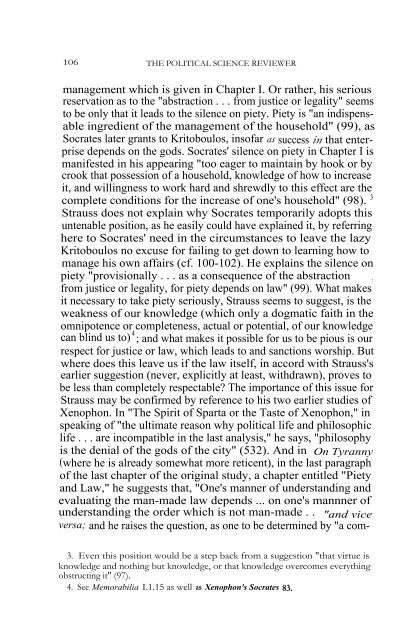Strauss on Xenophon's Socrates Xenophon's Socratic Discourse: An ...
Strauss on Xenophon's Socrates Xenophon's Socratic Discourse: An ...
Strauss on Xenophon's Socrates Xenophon's Socratic Discourse: An ...
You also want an ePaper? Increase the reach of your titles
YUMPU automatically turns print PDFs into web optimized ePapers that Google loves.
106 THE POLITICAL SCIENCE REVIEWER<br />
management which is given in Chapter I. Or rather, his serious<br />
reservati<strong>on</strong> as to the "abstracti<strong>on</strong> . . . from justice or legality" seems<br />
to be <strong>on</strong>ly that it leads to the silence <strong>on</strong> piety. Piety is "an indispensable<br />
ingredient of the management of the household" (99), as<br />
<strong>Socrates</strong> later grants to Kritoboulos, insofar as success in that enterprise<br />
depends <strong>on</strong> the gods. <strong>Socrates</strong>' silence <strong>on</strong> piety in Chapter I is<br />
manifested in his appearing "too eager to maintain by hook or by<br />
crook that possessi<strong>on</strong> of a household, knowledge of how to increase<br />
it, and willingness to work hard and shrewdly to this effect are the<br />
complete c<strong>on</strong>diti<strong>on</strong>s for the increase of <strong>on</strong>e's household" (98). 3<br />
<str<strong>on</strong>g>Strauss</str<strong>on</strong>g> does not explain why <strong>Socrates</strong> temporarily adopts this<br />
untenable positi<strong>on</strong>, as he easily could have explained it, by referring<br />
here to <strong>Socrates</strong>' need in the circumstances to leave the lazy<br />
Kritoboulos no excuse for failing to get down to learning how to<br />
manage his own affairs (cf. 100-102). He explains the silence <strong>on</strong><br />
piety "provisi<strong>on</strong>ally . . . as a c<strong>on</strong>sequence of the abstracti<strong>on</strong> .<br />
from justice or legality, for piety depends <strong>on</strong> law" (99). What makes<br />
it necessary to take piety seriously, <str<strong>on</strong>g>Strauss</str<strong>on</strong>g> seems to suggest, is the<br />
weakness of our knowledge (which <strong>on</strong>ly a dogmatic faith in the<br />
omnipotence or completeness, actual or potential, of our knowledge<br />
can blind us to) 4 ; and what makes it possible for us to be pious is our<br />
respect for justice or law, which leads to and sancti<strong>on</strong>s worship. But<br />
where does this leave us if the law itself, in accord with <str<strong>on</strong>g>Strauss</str<strong>on</strong>g>'s<br />
earlier suggesti<strong>on</strong> (never, explicitly at least, withdrawn), proves to<br />
be less than completely respectable? The importance of this issue for<br />
<str<strong>on</strong>g>Strauss</str<strong>on</strong>g> may be c<strong>on</strong>firmed by reference to his two earlier studies of<br />
Xenoph<strong>on</strong>. In "The Spirit of Sparta or the Taste of Xenoph<strong>on</strong>," in<br />
speaking of "the ultimate reas<strong>on</strong> why political life and philosophic<br />
life . . . are incompatible in the last analysis," he says, "philosophy<br />
is the denial of the gods of the city" (532). <strong>An</strong>d in On Tyranny<br />
(where he is already somewhat more reticent), in the last paragraph<br />
of the last chapter of the original study, a chapter entitled "Piety<br />
and Law," he suggests that, "One's manner of understanding and<br />
evaluating the man-made law depends ... <strong>on</strong> <strong>on</strong>e's mannner of<br />
understanding the order which is not man-made . . "and vice<br />
versa; and he raises the questi<strong>on</strong>, as <strong>on</strong>e to be determined by "a com-<br />
3. Even this positi<strong>on</strong> would be a step back from a suggesti<strong>on</strong> "that virtue is<br />
knowledge and nothing but knowledge, or that knowledge overcomes everything<br />
obstructing it" (97).<br />
4. See Memorabilia I.1.15 as well as Xenoph<strong>on</strong>'s <strong>Socrates</strong> 83.

















